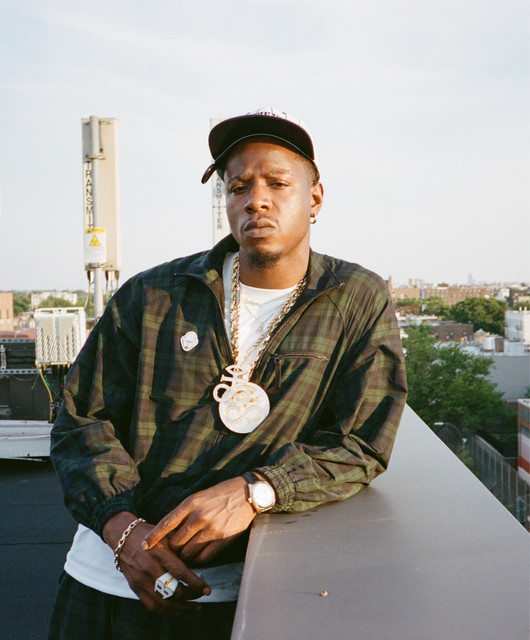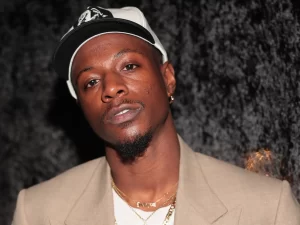This episode is part of the protest anthems series, the podcast about all things music, social justice, and protest.
In this episode, Natalie Nevins discusses Joey Bada$$’s 2017 release “Temptations,” where Bada$$ offers his take on systematic oppression in American society and its impact upon the African American community. Bada$$ utilizes his song as a way of exposing different experiences that African Americans undergo in this country, such as police brutality, in an effort to unite the greater good of his community, and ignite real meaningful change.
In April 2017, Joey Bada$$ released his album All-Amerikkkan Badass, which sparked heavy conversation about American society. Throughout the time period leading up to the release of this album, a multitude of unprovoked police killings of innocent Black men and women occurred.
For many Black Americans, the repeated killings taking place in their community became the final straw of frustration with the ongoing issue of systematic racism in this country.
To combat this frustration, as a part of his new album, Brooklyn rapper Joey Bada$$ released the song “Temptation” which addresses the systematic issues that run rampant in this country such as police brutality. Bada$$ utilizes his song to legitimize the experiences and feelings of African Americans, in an effort to uplift the entire community and show them that they are not alone.
“This just the way I feel mind’s been racing so long, It’s just no way to deal with these problems alone And I really can’t take it no more, I’ve been fighting temptations, my Lord I’m young and I’m restless (And I really can’t help it) I never felt selfish before I’ve been living so reckless, I know Tell me Lord, can you help me? (I said Lord, can you help me?)”
Along with Trump taking office the year prior, 2017 marked a devastating time period in terms of American history. In 2017 alone, a total of 986 people were shot and killed by the police, so Bada$$ felt that his song was the perfect opportunity to address what was going on in the country in an effort to better unite his community.
“As a young musician it started making me feel responsible… responsible for changing things”- Bada$$
To better emphasize the point he is making in his song about police-brutality, Bada$$ samples nine year old Zianna Oliphant’s iconic speech at Charlotte’s City Hall. The speech was given in response to the killing of Keith Scott, and this heart-wrenching audio illuminates the feelings of many African Americans regarding the unjust killings happening within their community, in order to emphasize the way in which these emotions are a shared experience.
“I feel that we are treated differently than other people and I don’t like how we are treated. Just because of our color doesn’t mean anything to me” – Oliphant
According to the Rutgers School of Criminal Justice, police shootings are the leading cause of death for Black cisgender boys and men who are 2.5 times more likely to be killed by police than their white counterparts. Not to mention black men face about a 1 in 1,000 chance of being killed by police over their life course. These statistics serve as great context for “Temptation” which focuses on systematic oppression in the Black community, in order to legitimize the reality of what it means to be African American in this country.
“Until they leave ’em lifeless Another mama cryin’, it’s another crisis”
Throughout his song, Bada$$ echoes a message which realizes a vital need for change in the way African Americans are expected to live in this country. As he states “I know we can’t continue livin like this,” one can directly see his personal intentions for the song, which were to expose the reality of the oppressed African American life in this country in an effort to unite and bring together a community, who experiences the effects of this oppression everyday. Through his music, Bada$$ has always been committed to his role as an activist and does not shy away from that responsibility. In fact, in an interview with Prefix Bada$$ actually revealed, “It’s the problems in the world that we get our inspiration from, these people need voices to speak for them. We’re the voice of the people.”
“I realized that I am a man of the world and I have the opportunity to speak for people who don’t have a voice.” – Bada$$
“The government been tryna take away what’s ours… I just wanna see my people empowered.”
These lyrics demonstrate Bada$$’s conscious effort to address the prevalent issues in American society that detrimentally affect African Americans. In referencing how “the government’s been tryna take away what’s ours,” Bada$$ is encapsulating the message that systematic oppression is at the forefront of American society in order to fully display the real-life experiences that exist within the African American community. Bada$$ then transitions to talking about how he wants to see his “people empowered” which directly embodies the intent behind the song, which is to unify the entire Black community, in order to uplift and show them that they are not alone in their experiences.
“The media just tryna make a villain.”
Within his song, Bada$$ addresses different systematic issues such as police brutality, as well as the media’s role in that oppression. He asserts the notion “the media just tryna make a villain” to expose the way in which the media consistently paints a narrative that directly plays into the ongoing issues of systematic oppression within the African American community. In a similar fashion, American singer songwriter H.E.R. took to her own music to address these evergrowing issues. In her famous song “I Can’t Breathe” written in response to the police murdering of George Floyd, H.E.R. exposes the pillars of systematic oppression, such as the media, in an effort to unite her community and legitimize the feelings of African Americans everywhere.
“Media perception is forced down the throats of closed minds So it’s lies in the headlines And generations of supremacy resulting in your ignorant, privileged eyes.”
The powerful lyrics of H.E.R.’s song directly reflect the similarities to Bada$$’s “Temptation.” “Media perception” being “forced down throats” along with“generations of supremacy” demonstrates the role of the media in relation to coverage of police brutality, illustrating the way in which so many different systems in American society all work together in their own ways to oppress the Black community. As a result, both “I Can’t Breathe” and “Temptation” work side by side to expose these shortcomings of the media, in order to legitimize the daily experiences of African Americans in this country.
Bada$$ goes on to end his song in a similar fashion to how he starts it, with the rest of Zionna Oliphant’s heartfelt speech:
“We are black people and we shouldn’t have to feel like this We shouldn’t have to protest because y’all are treating us wrong We do this because we need to and we have rights.” – Oliphant
In an effort to further emphasize the overall goal for his song, Bada$$ turns to the message within Oliphant’s speech, which emotionally begs the listener to come to an understanding about the experience of what it means to grow up Black in this country. Bada$$ utilizes the 9 year old at the conclusion of his song in order to bring his community closer together, and to legitimize the feelings of African Americans across the country, so that they no longer drown alone in these emotions. Furthermore Bada$$ forces his listeners to acknowledge the fact that African Americans should not have to live nor feel like this as Oliphant wisely states, serving as a serious call out for change.
“It’s something that we all have to change, we all have to come together to change that effect to take a conscious effort to wake people up, out of their sleep of not seeing through the bullshit, and that’s the step I’m taking with my music” – Bada$$


Leave a Reply